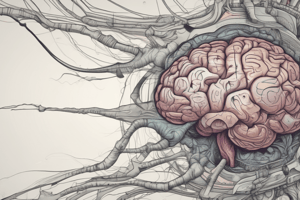Podcast
Questions and Answers
Which function is primarily governed by the frontal lobe?
Which function is primarily governed by the frontal lobe?
What is a key symptom associated with Frontotemporal Dementia (FTD)?
What is a key symptom associated with Frontotemporal Dementia (FTD)?
Which of the following assessments can be used to identify behavioral symptoms like apathy?
Which of the following assessments can be used to identify behavioral symptoms like apathy?
What is one of the main roles of the temporal lobe?
What is one of the main roles of the temporal lobe?
Signup and view all the answers
Which external aids can support working memory in cognitive rehabilitation?
Which external aids can support working memory in cognitive rehabilitation?
Signup and view all the answers
What is one of the primary impacts of tau protein accumulation in the brain?
What is one of the primary impacts of tau protein accumulation in the brain?
Signup and view all the answers
What type of training might family education involve to help manage emotional outbursts?
What type of training might family education involve to help manage emotional outbursts?
Signup and view all the answers
Which neuroimaging technique might be helpful in diagnosing frontal and temporal neurology issues?
Which neuroimaging technique might be helpful in diagnosing frontal and temporal neurology issues?
Signup and view all the answers
What is the most likely diagnosis for the patient showing symptoms such as disinhibition, apathy, and loss of empathy?
What is the most likely diagnosis for the patient showing symptoms such as disinhibition, apathy, and loss of empathy?
Signup and view all the answers
Which neuroimaging technique is most helpful in assessing frontal and temporal atrophy in patients suspected of having FTD?
Which neuroimaging technique is most helpful in assessing frontal and temporal atrophy in patients suspected of having FTD?
Signup and view all the answers
Which behavioral intervention is recommended for a patient with social functioning impairments in FTD?
Which behavioral intervention is recommended for a patient with social functioning impairments in FTD?
Signup and view all the answers
What cognitive assessment is specifically used to evaluate executive function in patients suspected of having FTD?
What cognitive assessment is specifically used to evaluate executive function in patients suspected of having FTD?
Signup and view all the answers
What symptom is NOT typically associated with Frontotemporal Dementia?
What symptom is NOT typically associated with Frontotemporal Dementia?
Signup and view all the answers
In a case of patient with normal speech production but impaired speech sound identification, which region of the brain is likely involved?
In a case of patient with normal speech production but impaired speech sound identification, which region of the brain is likely involved?
Signup and view all the answers
Which of the following symptoms is a key indicator of behavioral variant Frontotemporal Dementia?
Which of the following symptoms is a key indicator of behavioral variant Frontotemporal Dementia?
Signup and view all the answers
Which therapy is suggested for helping a patient maintain language skills in cases of FTD?
Which therapy is suggested for helping a patient maintain language skills in cases of FTD?
Signup and view all the answers
Which of the following symptoms is commonly associated with frontal lobe syndrome?
Which of the following symptoms is commonly associated with frontal lobe syndrome?
Signup and view all the answers
What cognitive function is primarily disrupted in patients with dysexecutive syndrome?
What cognitive function is primarily disrupted in patients with dysexecutive syndrome?
Signup and view all the answers
In addition to an MRI, which neuroimaging technique can be helpful in diagnosing frontal lobe syndrome?
In addition to an MRI, which neuroimaging technique can be helpful in diagnosing frontal lobe syndrome?
Signup and view all the answers
What behavioral symptom may be observed in patients with frontal lobe lesions?
What behavioral symptom may be observed in patients with frontal lobe lesions?
Signup and view all the answers
What is a common emotional symptom associated with frontal lobe damage?
What is a common emotional symptom associated with frontal lobe damage?
Signup and view all the answers
What is a possible depiction of confabulation in patients with dysexecutive syndrome?
What is a possible depiction of confabulation in patients with dysexecutive syndrome?
Signup and view all the answers
Which of the following contributes to a reduction in goal-directed actions in frontal lobe syndrome?
Which of the following contributes to a reduction in goal-directed actions in frontal lobe syndrome?
Signup and view all the answers
Which of the following statements is true regarding the deficits seen in frontal lobe syndrome?
Which of the following statements is true regarding the deficits seen in frontal lobe syndrome?
Signup and view all the answers
Signup and view all the answers
Study Notes
Case Studies in Neuropsychology
- Case 1 involves a patient referred with memory and attention impairments, loss of emotional control, and repetition of actions. Frontal lobe lesions are evident on MRI.
- Possible diagnosis: Dysexecutive syndrome or frontal lobe syndrome. Frontal lobe damage disrupts planning, decision-making, emotional regulation, and working memory.
- Frontal lobe functions: crucial for executive functions, problem-solving, emotional regulation, production (Broca's area), language, and social behaviors. Damage leads to behavioral problems, difficulty concentrating, and personality changes. Significant impact on daily life.
- Cognitive symptoms: memory, planning & reasoning impairments, attention deficits, difficulty with consequences, and confabulation (false memories).
- Emotional symptoms: loss of inhibition, emotional control, and poor impulse control.
- Behavioral symptoms: inappropriate use of objects, repetition of actions.
- Neuroimaging techniques: MRI is helpful. Potential additional techniques include fMRI, DTI, and PET scans. These tools assess different aspects of brain function.
Case 2
- About a 65-year-old patient, with disinhibition, impulsivity and some mild speech impairment. Some memory problems are also noted. Neuroimaging shows large frontal and mild temporal impairment. Genetic testing reveals Tau protein accumulation.
- Possible diagnosis: Frontotemporal Dementia (FTD).
- Frontal and temporal lobes: govern cognitive and emotional functions, decision-making, problem-solving, emotional regulation, language, and memory.
- Tau protein accumulation: damages brain cells, impacting personality changes, impaired judgment, loss of empathy, and disinhibition, and often leading to language difficulties.
Case 3
- A patient with a history of chronic alcoholism presents with symptoms of amnesia, confabulation (fabricating memories), apathy, and lack of insight. A CT scan reveals neuronal loss and gliosis in the periventricular gray matter.
- Possible diagnosis: Korsakoff syndrome (KS) resulting from Thiamine deficiency, causing damage to the mammillary bodies and thalamus.
- Neuroimaging techniques: MRI (detects atrophy of mammillary bodies and thalamus), DTI (assesses damage to white matter tracts in memory circuit), and FDG-PET (identifies hypometabolism in diencephalic regions).
Case 4
- A 75-year-old male patient experiences a sudden, short period of amnesia (4 hours), accompanied by headache and nausea.
- Possible diagnosis: Transient Global Amnesia (TGA).
- Core features: acute onset of anterograde amnesia (inability to form new memories) with intact self-awareness, repetitive questioning, and difficulty forming new memories.
- Neuroimaging techniques include CT scan (to rule out vascular issues like stroke, TIA) and MRI with DWI (Diffusion-weighted Imaging; to detect possible focal areas of injury).
- Emotional impact: counselling to manage anxiety and recurrence.
Case 5
- A 72-year-old patient with memory loss, signs of agitation, anomia (word-finding difficulties), and hippocampal atrophy.
- Possible diagnosis: Alzheimer's Disease (AD).
- Symptoms: Memory and language difficulties, and memory deficits.
- Neuroimaging techniques: FDG-PET (examines glucose metabolism), Amyloid PET (detects amyloid-β plaques), and tau PET (detects tau tangles).
- Assessment: tests for episodic memory and naming deficits
Case 6
- A patient presents with speech comprehension impairment (while repetition remains intact), mild meaning disturbances of words, and lesions in the white matter tracts in the temporal lobe.
- Possible diagnosis: Transcortical Sensory Aphasia (TSA)
- Symptoms: difficulty understanding speech, but the ability to repeat words and sentences, and the presence of word meaning disturbances.
Case 7
- A patient experiencing fluent speech with comprehension deficits following a TBI (traumatic brain injury).
- Possible Diagnosis: Wernicke's Aphasia.
- Symptoms: difficulties with word selection, repetition, and disturbances in sentence meaning.
- Key features: fluent but meaningless speech, impaired comprehension, intact repetition.
Case 8
- A 28-year-old patient exhibits a lack of repetition and word-finding difficulty.
- Possible Diagnosis: Conduction Aphasia
- Symptoms: Impaired repetition and mild naming and writing deficits.
- Patient is aware of these errors, but their speech may still lack accuracy.
Case 9
- A patient with telegraphic speech, lack of prosody, impaired repetition and naming, agrammatism, motor difficulties, like dysarthria, right hemiparesis, and ideomotor apraxia.
- Possible Diagnosis: Broca's Aphasia
- Symptoms: non-fluent and effortful speech; intact ability for repetition and comprehension
- Neuroimaging: MRI or fMRI to assess areas linked to language production and/or speech.
Case 10
- A patient with memory impairments, disinhibition, apathy, loss of empathy, impulsivity, and inappropriate social behaviors.
- Possible Diagnosis: Frontotemporal Dementia (FTD)
- Symptoms: severe impairment in frontal and temporal lobes.
- Neuroimaging: MRI, FDg-PET to see frontal and temporal atrophy.
Studying That Suits You
Use AI to generate personalized quizzes and flashcards to suit your learning preferences.
Related Documents
Description
Explore case studies focusing on neuropsychological disorders related to frontal lobe damage. Learn about the symptoms, diagnosis, and the impact on executive functions, emotional regulation, and daily life activities. This quiz delves into cognitive and behavioral challenges faced by patients with frontal lobe syndromes.



